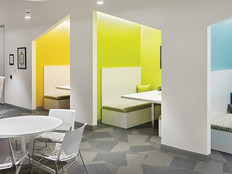Virginia Universities Construct Virtual Computing Labs
Four Virginia colleges join forces to build an online lab that offers students and faculty, anytime, anywhere access to standard business applications.
Many faculty and students who use math, statistical and database programs have gone through the time-consuming process of loading them up on their local PCs and paying expensive yearly license fees to keep up with the applications’ latest features and benefits. Four Virginia colleges are now looking to help these users out.
Through a cooperative pilot program by George Mason University, James Madison University, Virginia Commonwealth University and William & Mary, the schools’ faculty and students have access to updated versions of these applications at a dramatically lower cost through the Virtual Computing Lab (VCL).
The VCL pilot is a series of server blades that run an open-source scheduling system for virtual computing services. This, in turn, allows students and faculty at the four schools to register for applications such as Mathematica, SPSS and Microsoft Access over a common web interface. Licensing fees are reduced because the cost burden is shared.
“Traditional computer labs are only open at set times during the day,” says Sharon Pitt, executive director of the Division of Instructional Technology at George Mason University, which is heading up and physically hosting the VCL pilot. “With the VCL, students and faculty have access to the applications 24x7.”
Pitt adds that the group opted for an open-systems platform so it could free up funds for the application, computing infrastructure and support.
The pilot will run over the next 12 to 18 months, with the hope that the VCL will evolve and gradually include at least 14 additional Virginia colleges and universities.
Blade Centric
John Savage, GMU’s director of advanced academic computing, says the core VCL technology is the IBM BladeCenter H. The BladeCenter H pilot has 14 server blades, each operating dual quad-core Xeon processors. The blades collectively run a clustered virtualizationhypervisor such as the free VMware ESXi server. This cluster is in turn managed through the front-end VCL scheduling and management system that is based on open-source software, including Linux operating systems, Apache web servers and MySQL databases. Savage says depending on the size of the application, each blade is running 10 to 20 VMware virtual machines (VMs).
For security, the VCL has a Check Point firewall and an eSafe gateway from Aladdin Knowledge Systems, which filters unwanted content such as malware, e-mail spam, computer viruses and spyware. The VCL will run over its own 10 gigabit internal network via the IBM BladeCenter itself, as well as external 10 gigabit D-Link routers. The D-Link routers will connect the blades to the Internet and to local storage as the VCL expands.
One of the group’s goals is to determine usage patterns. “We want to find out how many requests there are for each type of software and under how much network traffic,” says Savage. “Once we have that information, we’ll know how many licenses we need to purchase for each application.”
A big benefit of the VCL is more flexible network management. Savage can now easily roll out an application upgrade as a VM and make sure it is running properly before deploying it in production mode on the network.








